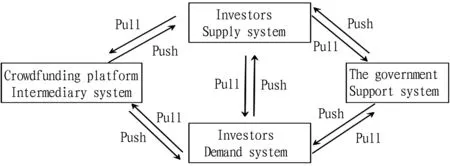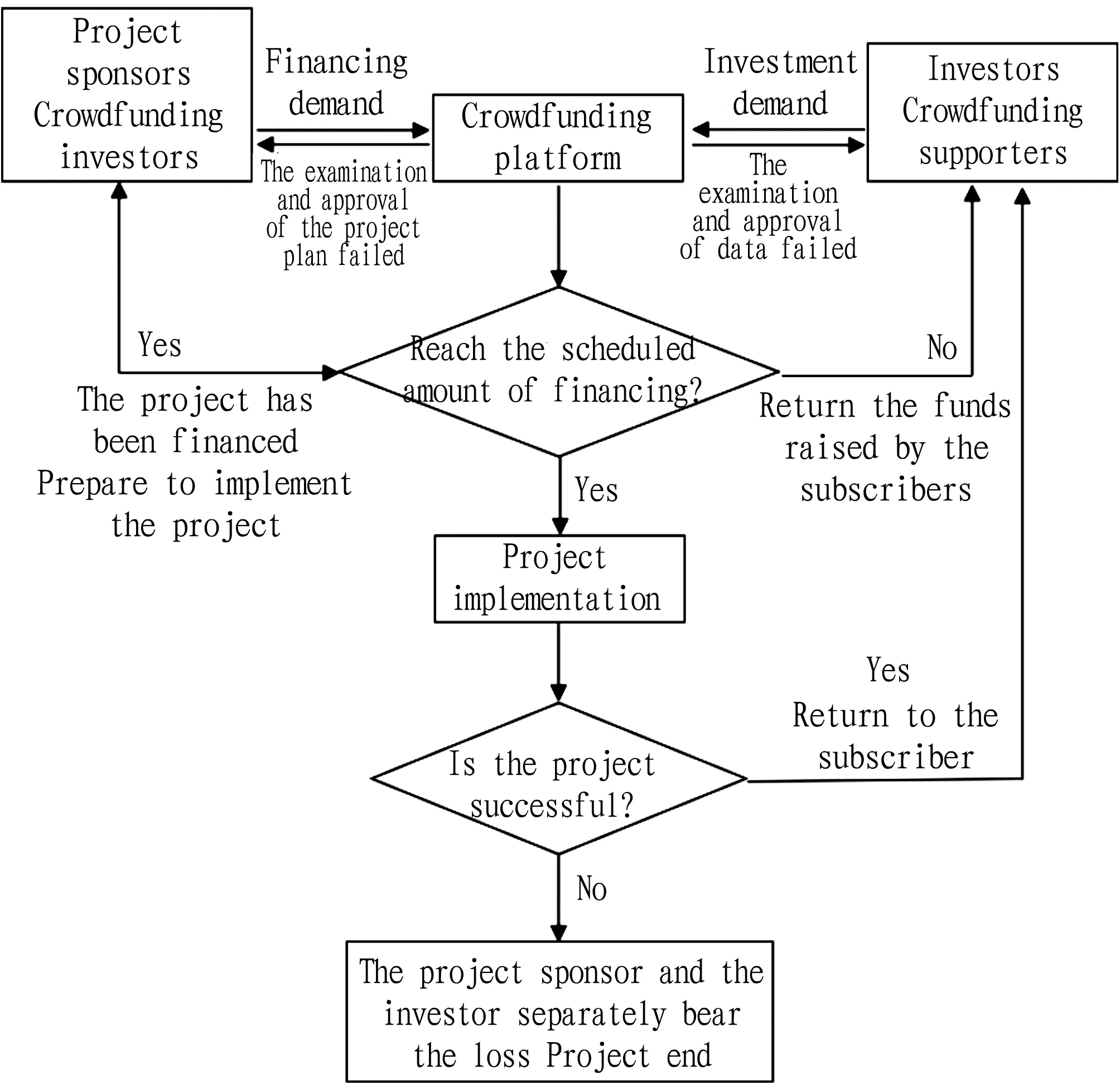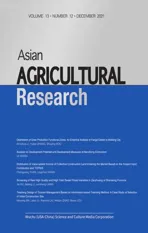Research on the Operation Mechanism and Promotion Path of Crowdfunding for Rural Tourism
2021-02-17HongxiaDONGHuiWANG
Hongxia DONG, Hui WANG
1. School of Tourism, Taishan University, Taian 271000, China; 2. School of Economics and Management, Taishan University, Taian 271000, China
Abstract This paper studies the operation mechanism of crowdfunding for rural tourism from three aspects: the main body of crowdfunding for rural tourism, driving factors and operating stage. At the same time, this paper analyzes the operation risk of crowdfunding for rural tourism from five aspects: legal risk, information asymmetry risk, capital security risk, interest subject conflict risk and industry development risk. It also puts forward measures and suggestions on the promotion of crowdfunding for rural tourism from four aspects: improving market awareness, providing professional services, issuing relevant laws and regulations and regulating the development of the industry.
Key words Rural tourism, Crowdfunding, Operation mechanism, Promotion path
1 Introduction
With the acceleration of urbanization, the consumption demand of urbanites to stay away from the hustle and bustle of the city and relax their body and mind has led to the sustainable development of rural tourism. The number of rural tourists and tourism income in China increased continuously from 2012 to 2019. The number of tourists increased from 720 million in 2012 to 3.09 billion in 2019, with an average annual growth rate of 33%. Tourism income increased from 220 billion yuan in 2012 to 1.81 trillion yuan in 2019, with an average annual growth rate of 103%. Driven by the strong market demand, the financing problems such as single financing channel and imperfect financing platform of rural tourism have become the "bottleneck" restricting the high-quality development of rural tourism. There is an inherent connection between the crowdfunding financing model of the Internet platform and the rural tourism, which has attracted the attention of the relevant subjects of rural tourism, and this model has become a new way for rural tourism to solve single financing channel problems and financing difficulties.
2 Crowdfunding for rural tourism
Crowdfunding means that the project party initiates a fund-raising activity to engage in a certain activity through the network platform, and the investor can get a certain emotional reward, payments in kind or service through a small amount of capital investment. It is essentially a new type of financial service. In a general sense, crowdfunding is a financing model adopted by small and medium-sized enterprises to carry out personalized projects, which can not only help to achieve the financing goal, but also contribute to the further development of the project.
The main body of rural tourism management is small and medium-sized enterprises, and the innovation and participation of rural tourism projects are strong. Crowdfunding has become one of the choices of many rural tourism operators. Mostly, the crowdfunding for rural tourism is for investors to invest in tourism products, tourism services or tourism projects in the way of subscription, in order to obtain certain rights and interests regarding materials or services.
3 Operation mechanism of crowdfunding for rural tourism
3.1 Main body of crowdfunding for rural tourism
The operation model of the crowdfunding for rural tourism mainly involves three subjects, namely, the project sponsor, the investor and the crowdfunding platform.3.1.1
Project sponsors. The project sponsors, namely fundraisers, refer to the enterprises or individuals who release crowdfunding projects through the crowdfunding platform to obtain financial support. The main body of the crowdfunding for rural tourism project is small and medium-sized tourism enterprises or individuals. On the one hand, the reason why rural tourism fundraisers adopt crowdfunding model is that it is difficult to obtain funds by using traditional venture capital, loans and other financing methods because of the long investment cycle and low return on investment of rural tourism projects. On the other hand, while the rural tourism project uses the crowdfunding model to obtain funds, it can promote the project and attract potential supporters or consumers of the rural tourism project, making crowdfunding an organic part of project marketing.3.1.2
Investors. Investors, that is, crowdfunding investors, refer to the public who participate in crowdfunding projects. The investors of crowdfunding for rural tourism are mainly tourists or potential tourists. Crowdfunding investors are investors, so they have the investor characteristics of demanding rewards and bearing risks, and they are also consumers of crowdfunding projects for rural tourism, with the dual roles of investors and consumers. In the process of launching the project, the interaction between the project sponsor and the investor of the crowdfunding project for rural tourism will attract other crowdfunding enthusiasts or investors to follow suit, resulting in a herding effect. At the same time, project investors will publicize their crowdfunding investment experience to the surrounding crowd as investors or consumers, and expand the scope of influence of crowdfunding projects and crowdfunding platforms.3.1.3
Crowdfunding platform. Crowdfunding platform refers to the Internet media that connects the project sponsor and the investor. Before the project is launched, the crowdfunding platform will screen the qualifications of the project sponsors and establish a communication channel for the project sponsors and investors. In the course of the project, the crowdfunding platform can serve as a platform for interaction between the project sponsors and investors, and follow up and monitor the progress and quality of the project. After the successful launch of the project, the crowdfunding platform assumes the function of financing medium, provides funds to the project sponsors in batches, completes the project financing link, and realizes the return on investment to the investors in accordance with the project agreement. If the project fails, the crowdfunding platform will return all the funds raised to the investors. It can be seen that the crowdfunding platform is connected with all stakeholders of crowdfunding projects for rural tourism and is the center of the crowdfunding system.3.2 Mechanism of driving of crowdfunding for rural tourism
Consumers’ yearning for nature gives birth to the supply of rural tourism, and the growing demand for rural tourism promotes the emergence of intermediaries. The support system with the government as the main body provides all-round support for the supply system and intermediary system in terms of policy, funds and talents, so as to promote the good development of crowdfunding model for rural tourism. This paper analyzes the crowdfunding driving mechanism of rural tourism from four systems: demand system, supply system, intermediary system and support system, as shown in Fig.1.
Fig.1 Driving mechanism of crowdfunding for rural tourism
3.2.1
The demand system driving factor of crowdfunding for rural tourism: the demand of crowdfunding investors. Tourists are the main body of crowdfunding investors for rural tourism, and tourists’ demand for rural tourism constitutes the demand system driving factor of crowdfunding for rural tourism. The demand of crowdfunding investors for tourism mainly include two aspects: on the one hand, due to the fast pace and high pressure of urban life, people are eager to be close to nature and experience pastoral life, and rural tourism with natural characteristics and experience meets people’s consumption needs; on the other hand, due to the improvement of people’s income level, there is a certain investment demand, and the motivation to obtain investment return.3.2.2
The supply system driving factor of crowdfunding for rural tourism: the demand of crowdfunding fundraisers. Small and medium-sized tourism enterprises are the main body of crowdfunding fundraisers for rural tourism, and the capital needs of small and medium-sized tourism enterprises constitute the supply system driving factor of crowdfunding for rural tourism. Rural tourism is faced with the obvious dilemma of long investment cycle, small enterprise scale and low credit level, which leads to a mismatch between investment demand and supply in the industry. Crowdfunding, a new financing model, enables tourism enterprises to bypass traditional financial barriers and cross spatial constraints to achieve financing goals. At the same time, it attracts tourists to become consumers by virtue of the characteristics of the rural tourism industry, and realizes the economic benefits of travel, accommodation, food, shopping and entertainment.3.2.3
The intermediary system driving factor of crowdfunding for rural tourism: the demand of crowdfunding platform. Crowdfunding platform is the intermediary system of crowdfunding for rural tourism, and the development demand of crowdfunding platform constitutes the driving factor of the intermediary system. The operating profit of the crowdfunding platform can be obtained by drawing a proportion of the financing amount of successful crowdfunding projects, or by charging marketing fees according to the flow capacity of the platform, or by investing shares in the capital operation of the platform. Therefore, on the one hand, the crowdfunding platform will encourage the supply system to provide high-quality crowdfunding for rural tourism projects, on the other hand, guide consumer demand, and promote it into tourism activity by improving the quality of service.3.2.4
The support system driving factor of crowdfunding for rural tourism: government demand. Government demand as the support system driving factor of crowdfunding for rural tourism comes from three aspects: first, crowdfunding makes up for the lack of support from China’s traditional financial system to the development of rural tourism industry; second, in the process of implementing the new urbanization strategy, rural tourism is an important part in the field of urbanization investment; third, the attributes and characteristics of rural tourism industry fully meet the requirements of economic transformation and development, and it can effectively achieve the unity of economic, social and environmental benefits, and achieve high-quality and sustainable development of regional economy.3.3 Crowdfunding operation phase of rural tourism
The operation of crowdfunding for rural tourism is divided into four stages, and its operation process is detailed in Fig.2.In the first stage, the project sponsor formulates the crowdfunding project plan, which includes the project introduction, financing objectives, financing days and return mechanism,etc.
, and the crowdfunding project plan is submitted to the crowdfunding platform for review. The creative products of the crowdfunding project and the credit of the crowdfunding project sponsor are the key to the approval by the crowdfunding platform in the first stage.In the second stage, the crowdfunding project plan is approved by the platform, and the project sponsor reaches a contract with the crowdfunding platform, and publishes the project information on the crowdfunding platform; if it is not examined and approved, the crowdfunding project fails.

Fig.2 Flow chart of crowdfunding for rural tourism
In the third stage, the investor chooses the crowdfunding project independently through the crowdfunding platform, and completes the subscription within the project financing period, and it cannot be subscribed after the expiration of the time limit.
In the fourth stage, if the fund-raising amount is completed within the fund-raising period, the crowdfunding will be successful; otherwise, the project crowdfunding will fail. If the project crowdfunding is successful, the project will enter the operation stage, and the crowdfunding platform will inject crowdfunding funds into the project in accordance with the agreement, and the project sponsor needs to give crowdfunding returns to the investors as agreed.
4 Operation risk of crowdfunding for rural tourism
The operation of crowdfunding for rural tourism is to raise funds from unspecific investment objects of the project, and there are a series of risks in the operation of the project, including the following four aspects.
4.1 Legal risk
The legal risk of operation of crowdfunding for rural tourism mainly comes from three levels. First, there is no relevant law on crowdfunding, and crowdfunding for rural tourism may touch the legal red line of illegal fund-raising. Second, there is no corresponding legal provisions to protect the legitimate rights and interests of crowdfunding investors for rural tourism, and investors can only protect their rights from the crowdfunding platform. Third, in the crowdfunding process, the project creativity and detailed information need to be displayed in detail on the crowdfunding platform to attract investors to invest, which makes the original and innovative projects of crowdfunding for rural tourism face the risk of intellectual property plagiarism.4.2 Capital security risk
The fund security risk of operation of crowdfunding for rural tourism mainly comes from the fund management risk of crowdfunding platform. The investors’ funds for the rural tourism crowdfunding project are first deposited into the crowdfunding platform or the account of a third-party depository agency. If the crowdfunding is successful, the crowdfunding platform will pay the project funds to the project sponsor in accordance with the agreement. On the contrary, the crowdfunding platform will return the funds to the investors. This process protects investors from being cheated by fake projects to a certain extent, but at the same time, if there is poor supervision by the crowdfunding platform and third-party depository institutions, investors will face the risk of misappropriation of funds by crowdfunding platforms or third-party depository institutions.4.3 Risk of conflict among stakeholders
Rural tourism is a highly comprehensive industry, which involves departments related to forestry, environmental protection, soil and water resources and so on. The stakeholders of the crowdfunding project for rural tourism involve the project sponsor, which may be small and medium-sized tourism enterprises or individuals or local villagers; the investors may be individuals or local villagers, and so on; there are also village-level, township and county-level local governments will also participate in the specific crowdfunding project process. At the same time, in terms of investment return, the return division of stakeholders and the distribution of benefit from land lease may lead to interest disputes, which have a serious impact on crowdfunding for rural tourism projects.4.4 Industry development risk
The industry for crowdfunding projects for rural tourism is mainly about natural disasters, such as typhoons, earthquakes, and landslides, which pose a great threat to the "survival" environment of rural scenic spots. For example, in the earthquake of Jiuzhaigou Scenic Spot in Sichuan, the landscape in the scenic spot was seriously damaged, which made investors suffer huge losses in tourism projects. On the other hand, there is a huge seasonal difference in the profitability of rural tourism projects, which has a certain negative impact on the investors of crowdfunding projects for rural tourism.5 Promotion path of crowdfunding for rural tourism
5.1 Promulgating relevant laws and regulations to protect the rights and interests of the subject
According to the actual situation of China, it is necessary to formulate and issue relevant laws and regulations of crowdfunding industry. On the one hand, it should be explicitly stipulated by law to draw a clear line between crowdfunding and illegal fund-raising and other illegal acts, and establish the legal status of crowdfunding; on the other hand, it is necessary to make clear provisions on the amount of crowdfunding, the number of investors, the scale of investment, and other aspects, and formulate standards at the legal level, which is conducive to the healthy and orderly development of the crowdfunding industry. In addition, it is necessary to establish relevant laws and regulations, register the owners of intellectual property rights, give project sponsors the right to freely choose whether to be public or not, improve the intellectual property protection of crowdfunding projects, and safeguard the rights and interests of project sponsors.5.2 Strengthening the capital supervision and regulating the development of the industry
The regulatory authorities should make clear the storage and management of funds in crowdfunding projects for rural tourism. For the supervision of third-party institutions, we can cooperate with banks with relatively perfect internal risk management mechanisms and entrust banks to store and manage the investment funds of investors. For the self-regulation of the platform, first of all, there must be an effective internal risk management system within the platform, and secondly, the platform should disclose the situation of capital storage on a regular basis, so as to enable investors to obtain detailed information of investment funds.5.3 Strengthening management capacity and providing professional services
Crowdfunding platform should strengthen the management ability and provide professional services. First of all, due to the information asymmetry, the investor is facing greater investment risks, the crowdfunding platform should conduct a professional audit of crowdfunding projects for rural tourism before public offering, and make mandatory information disclosure regulations. Secondly, the crowdfunding platform should set up a reasonable mechanism to protect the creativity of the project, so as to better promote the disclosure of project information by project sponsors. Thirdly, the crowdfunding platform can enhance the influence of the platform to attract more investors to participate in crowdfunding projects for rural tourism through social network influence and customer accumulation ability, and push accurate information to investors who are highly matched with the project, to increase the attention to the project.5.4 Focusing on "four in one" to enhance market awareness
It is necessary to combine the government, crowdfunding platform, project sponsors and investors to build a "four-in-one" community of crowdfunding model for rural tourism, so as to enhance the influence and recognition of crowdfunding market for rural tourism.On the one hand, with the help of the National Agricultural Information Platform, the government can irregularly release the pro-agricultural policies on crowdfunding for agricultural leisure tourism projects, so as to allay the doubts of investors and consumers and attract more attention and support. On the other hand, the crowdfunding platform should give full play to the advantages of the platform, make use of user data information, explore and encourage rural tourism projects that meet the needs of the market to release crowdfunding information. Thirdly, investors and project sponsors should have a deeper understanding of the project information and the brand story behind it, attract more investors’ support, and improve the success rate of crowdfunding projects for rural tourism.
杂志排行
Asian Agricultural Research的其它文章
- Analysis on the Status Quo of the Public Space in Dashiyuan Community in Nanchang City and Its Renewal Strategies from Multiple Perspectives
- Effects of Storage Temperature on Postharvest Physiology of Amorphophallus cormifer Microbulb
- Research and Practice on Curriculum Reform of the Packaging Design Based on the Development Strategy of "Made in China 2025"
- Teaching Design of Tourism Management Based on Information-based Teaching Method: A Case Study of Selection of Hotel Construction Site
